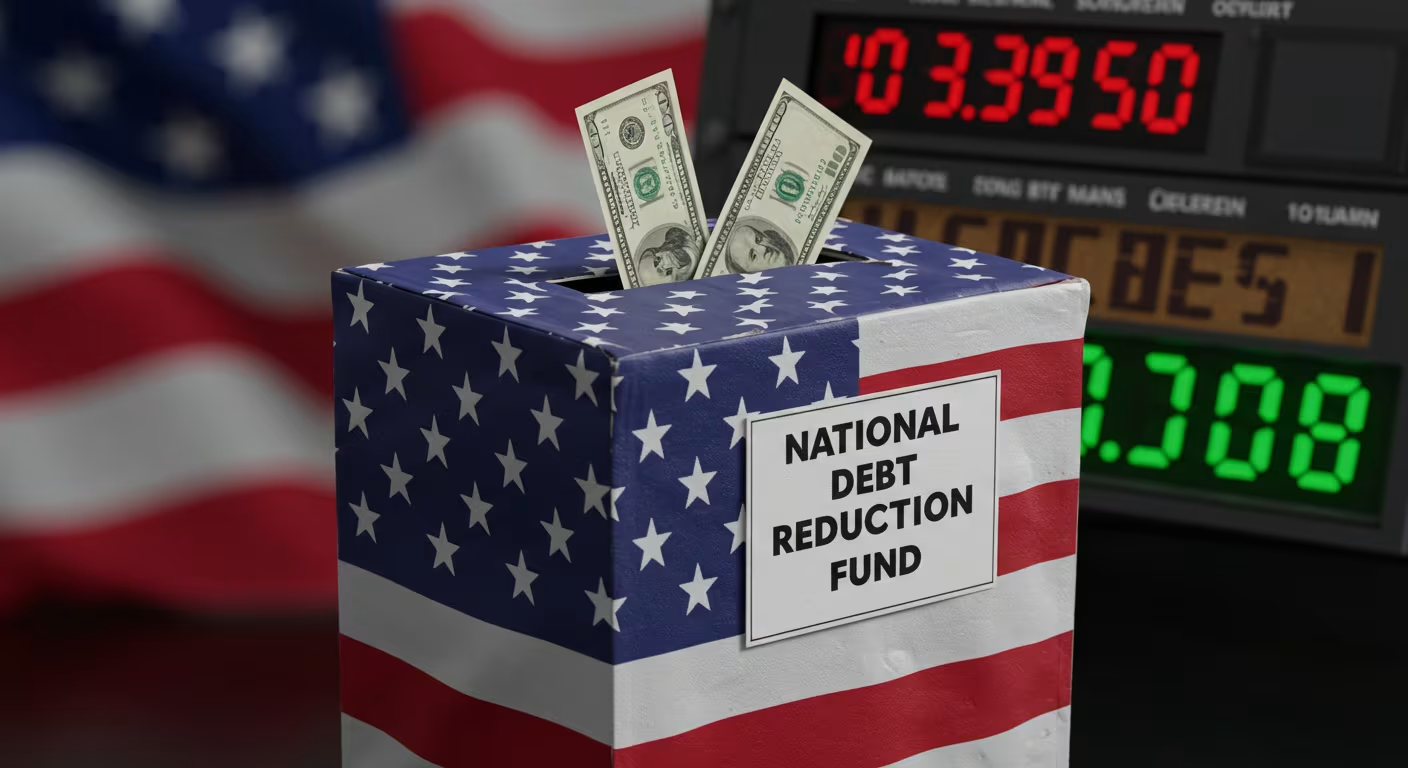As the U.S. national debt climbs past $34.5 trillion and interest payments on that debt surpass $1 trillion annually, policymakers, economists, and citizens alike are grappling with the question: What can be done to reduce America’s growing fiscal burden? While traditional strategies such as tax reform, entitlement restructuring, and spending cuts remain controversial and slow-moving, a more unconventional approach is resurfacing—public donations to pay down the national debt.
Though largely symbolic, the idea has gained attention amid growing concern over long-term fiscal sustainability. From private citizens writing checks to the U.S. Treasury to tech billionaires pledging future wealth for national causes, there is renewed interest in whether voluntary contributions from individuals and organizations could help shrink the debt. But how realistic is this strategy? And what does it say about the public’s relationship to government finance?
This article explores the mechanics, impact, and implications of encouraging citizens to donate toward the national debt, assessing whether it’s a serious fiscal policy or simply a patriotic gesture with minimal financial effect.
Yes, You Can Legally Donate to Pay Down the National Debt
Most Americans don’t know this, but the federal government has a system in place that allows private citizens to make voluntary contributions to reduce the national debt. Established under 31 U.S. Code § 3113, the “Gifts to Reduce the Public Debt” account accepts checks, money orders, and electronic payments through the U.S. Treasury.
Donations are typically collected by the Bureau of the Fiscal Service and credited directly to the general fund of the Treasury. The money is used to retire a portion of the national debt, and donors receive a receipt but no tax deduction.
From retirees sending in $10 checks to children mailing in piggy-bank savings, these contributions reflect a deep sense of civic responsibility. But in terms of scale, the numbers are modest. In 2023, total donations amounted to just under $1.5 million—hardly enough to make a dent in a debt measured in trillions.
Why the Idea Is Gaining Renewed Attention
In 2024, as debt ceiling debates escalate and public trust in Washington’s fiscal management erodes, the concept of citizen-funded debt reduction has gained new traction. Several developments have contributed to this:
- Social media-driven campaigns encouraging small-dollar donations to help “rescue the economy”
- High-profile philanthropic pledges from billionaires and corporate entities interested in boosting national resilience
- Populist calls to reduce government waste, with donations positioned as a moral counterweight to runaway spending
- Frustration with political inaction, leading people to take matters into their own hands—even symbolically
A handful of senators and think tanks have floated the idea of incentivizing donations through matching funds or offering recognition programs, such as naming donors on a public registry or providing ceremonial acknowledgments.
How Much Would Be Needed to Make a Real Difference?
To assess the potential of public donations, it helps to look at the math. If every one of America’s 130 million households donated $1,000 each, it would raise $130 billion—less than four months’ worth of interest payments. If every billionaire in the U.S. donated 10% of their net worth, that could yield an estimated $500 billion, still a small fraction of the overall debt.
In short, unless donation levels rose dramatically and consistently, the overall fiscal impact would remain negligible. What’s more, these donations don’t reduce the annual deficit—the amount by which spending exceeds revenue—they simply reduce the existing debt stock.
Still, even small payments could provide psychological and symbolic value, reinforcing public accountability and civic engagement.
Arguments in Favor of Encouraging Donations
Despite the limited fiscal impact, there are compelling arguments for promoting public contributions:
- Civic Engagement: Encouraging donations can increase awareness of national debt and promote financial literacy among citizens.
- Voluntary Patriotism: It provides an avenue for people to act on patriotic impulses without coercion or new taxes.
- Philanthropic Innovation: Wealthy donors already fund public universities, hospitals, and art institutions. Applying similar logic to debt reduction could generate goodwill and positive branding.
- Cultural Shift Toward Responsibility: Highlighting national debt as a shared burden could shift public attitudes toward more sustainable fiscal expectations.
- Supplementary Tool: While not a substitute for structural reform, it could complement a broader strategy involving tax, spending, and economic growth policies.
Criticisms and Limitations
Of course, the idea of donating to pay down the debt isn’t without criticism:
- Symbolism Over Substance: Many economists argue that the amounts raised are too small to make a real difference.
- Moral Hazard: Some critics worry that encouraging public donations could let politicians off the hook, diverting pressure away from necessary policy reforms.
- Equity Concerns: Lower-income individuals may feel guilted into donating while wealthy individuals or corporations exploit tax loopholes and lobbying influence.
- Lack of Incentives: With no tax deduction and little public recognition, there’s limited motivation for people to contribute.
- Trust in Government: Given low public trust in Congress, many citizens are reluctant to give more money to Washington without assurances on how it will be used.
Can Donations Play a Role in Broader Fiscal Reform?
Perhaps the most constructive role for public donations is not as a financial fix, but as a catalyst for larger conversations around fiscal reform. If donation campaigns are paired with efforts to educate citizens about deficits, interest payments, and long-term liabilities, they could help build momentum for:
- Entitlement sustainability reforms
- Tax system modernization
- Spending efficiency audits
- National debt education in schools
- Citizen panels on budget priorities
Some policy experts suggest that public contributions could be matched by a federal “Debt Reduction Fund” with transparent, legislated controls ensuring that funds are only used to retire principal—never for discretionary spending.
A Symbolic Act With Civic Value
Donating to pay down the U.S. national debt won’t solve the country’s fiscal challenges. But it could inspire a deeper commitment to financial accountability, transparency, and national unity. As the debt continues to grow and political solutions remain gridlocked, empowering the public—even symbolically—may be a step toward reestablishing shared responsibility for the country’s future.
In a political era defined by division and dysfunction, a voluntary act of contribution may be one of the few tools left to unite Americans around a common economic goal—even if only a modest one.





